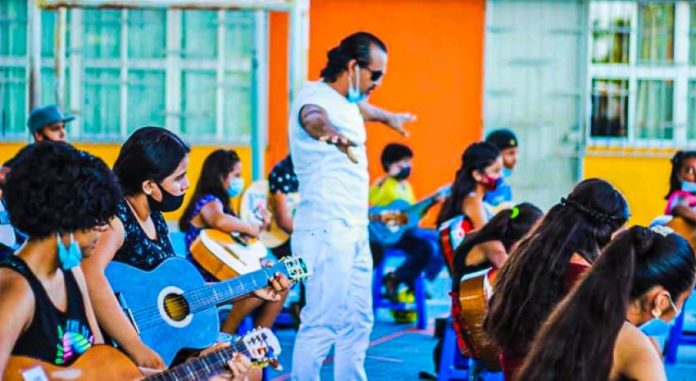Juan Rubén Antúnez, affectionately known as “Juanito Zihua,” has been a musician for 25 of his 46 years. Born in Mexico City, Juanito’s first job was as a metal worker on an assembly line, a position he detested so much that he begged his father to allow him one year to prove himself in the music industry.
Although he had little formal training — just a few months at the Libre Nacional de Música — music was fast becoming his passion.
With his father’s blessing and armed with a guitar and repertoire of just six songs, he headed across Mexico before arriving in Zihuatanejo as a full-time musician for most of 25 years. During that time, Juanito managed to buy a house, a car, and a motorcycle and support his wife and two children with money earned from performing at various clubs, restaurants and events.
While he was heading to a gig in the village of Troncones, located 45 minutes from Zihuatanejo, he noticed the many local children hanging out at the pool halls in the late afternoon. When he finished his show at 10 p.m., those same kids were still where he had last seen them.
As a father, it disturbed him. A conversation ensued, and he learned from the kids themselves that they had nothing better to do — it was either the pool hall or the beach.
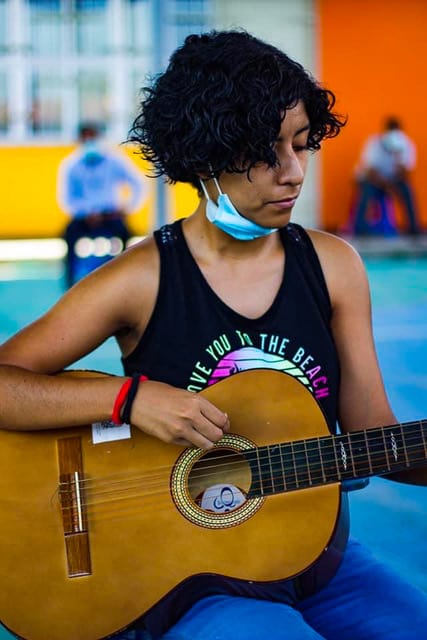
Juanito decided he would give lessons to any kid who wanted them, and so a makeshift school began with just a couple of students. The class was free, and they only had a couple of guitars, but as word and interest grew among the youth, people shared.
At one of these classes, an American woman who lived in the village took notice.
“At first, she was very suspicious, and she kept staring at me and asking me what I was doing with the children.”
Juanito says he can laugh now, but the encounter scared him as he recalled the questions about his intentions.
“I want to help kids and give them something to do. I didn’t want money. I’m not doing anything wrong. I want to teach these kids music,” he told her.
A couple of days later, Wendy returned, this time with other Americans who lived in the area. They observed the class without saying a word. The following week they came again, this time with an offer to buy guitars. The class grew.
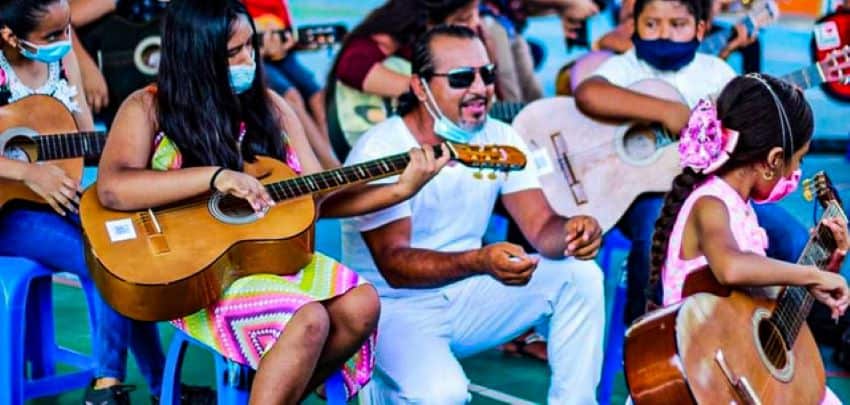
Although they insisted, Juanito refused to take any pay, but he accepted gas money for his car, with reluctance.
“I tried to explain that I was coming to work anyway, but they wouldn’t take no for an answer.”
Sadly, the program was disbanded as parents of students, who ironically paid zero to have Juanito teach, began to question him about his pay and even his motives. He decided at that point that it was time to walk away.
Although the parents then tried to put together something on their own and find other teachers to step in, the last thing that Juanito heard was that the project failed and was disbanded.
Discouraged, he looked around his neighborhood and realized that children were always on their phones and tablets. Still feeling that the program was doable, he started to teach in his own colonia, and once more for free.
As before, he immediately saw the positive difference the classes were making in his students’ lives, but they lacked guitars. He decided to approach the mayor of Zihuatanejo, Jorge Sánchez, for help.
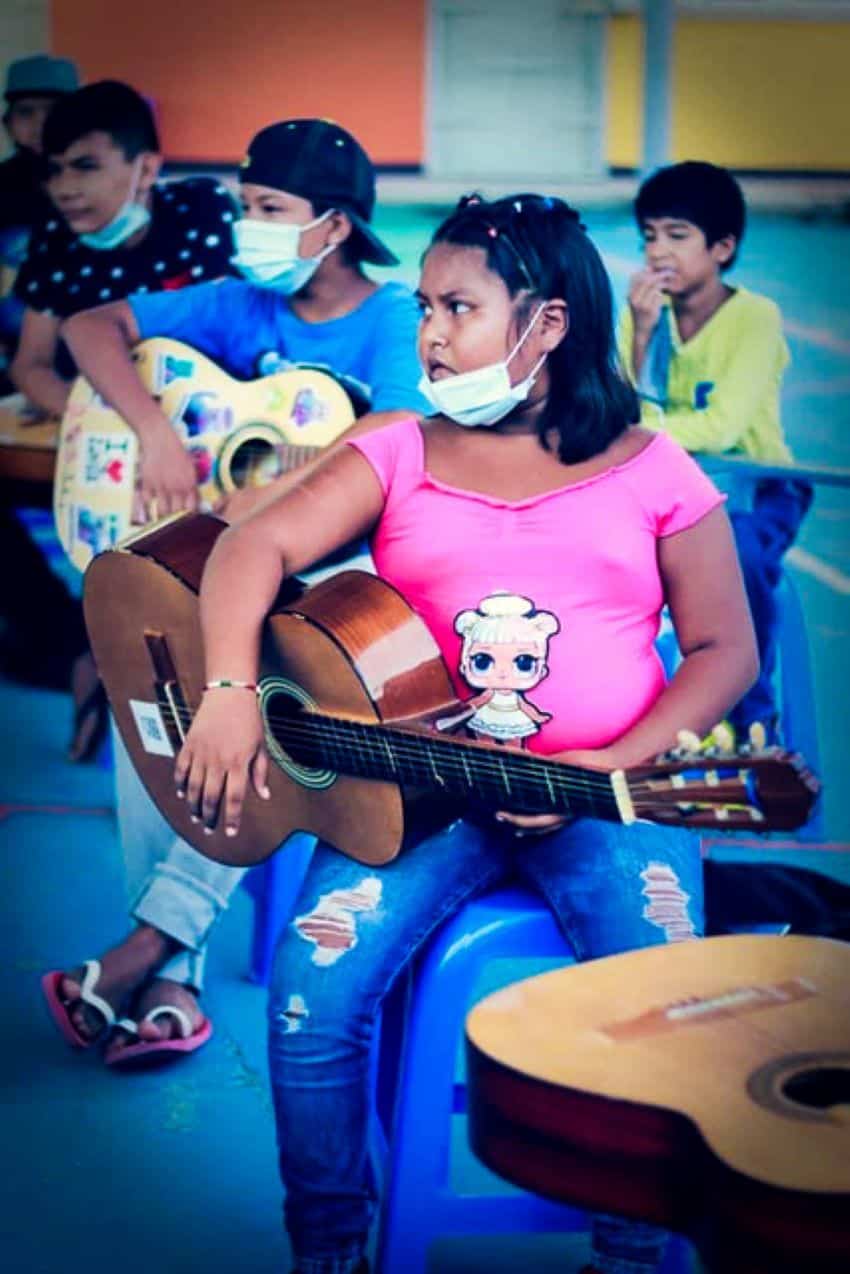
At first, they declined his proposal, citing location issues or possible conflict with the local Casa de Cultura. Discouraged but determined, Juanito mentioned it to Carol Romain, director of Por Los Niños, an educational charity run by mostly foreigners in Zihuatanejo.
Immediately she saw the value of the program, and together they returned to the mayor’s office with an offer to pay half for guitars, the cost of printing, and anything else the kids would need.
Juanito came up with the idea that instead of using government space and having the children come to one location, he would go to the neighborhoods where they lived on a once-a-week basis.
“There would be no excuses as to why a kid that signed up couldn’t make the class. And no worries about bus money since some of these kids had a long way to go to arrive downtown,” he said. “Every community has a concha [town gazebo], and it’s covered. They don’t have to sit in the rain or hot sun. And it’s already built, and it’s free.”
That argument, combined with someone else’s clout paying half the bill, convinced the local government to try out the project on a three-month basis. In total, they purchased 42 guitars. Still, with no pay, Juanito taught classes.
“The program is finished now, and it doesn’t look as if the city wants to continue especially with growing food shortages for some people,” he said. “But I believe this program is worthwhile on many levels. The children are our future, and education is everything.” He said his next step would be to approach the governor’s chief of staff.
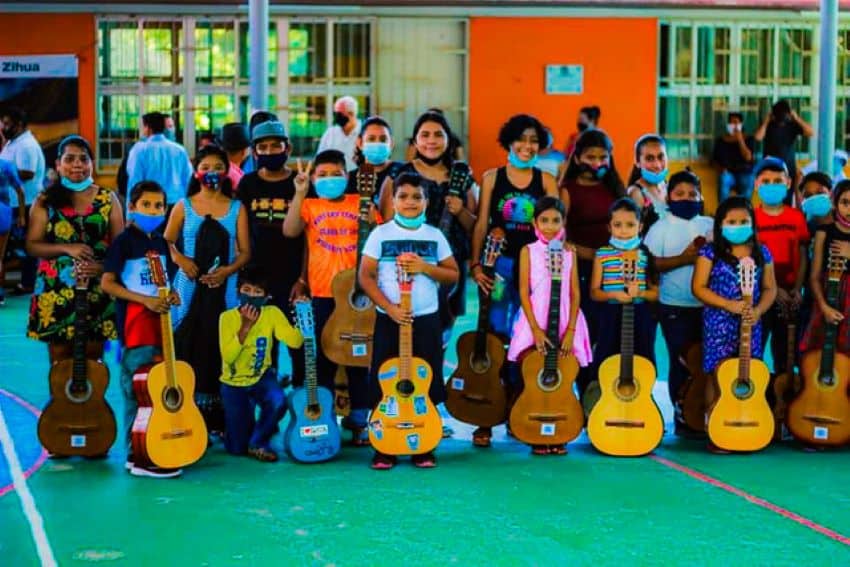
“I believe this project could go all over the state, maybe even all over Mexico,” he said. “We could hire work musicians to give classes in the offseason when they don’t have work. It would create employment and help kids stay out of trouble. And we are following all social distancing safety guidelines, mask-wearing and washing hands and guitars.
“This is more than just teaching kids a few chords so they can play a few songs. We play games, do trivia riddles and work on dynamics. Most of all I teach them to feel valued and that someone believes in them. And how to believe in themselves. So that every day, the desire to master the guitar becomes stronger.”
And even though the classes are free, the children still come, he said.
“I teach them discipline. My classes are strict too,” he added. “If you’re late, you get one chance. If you’re late again, you’re out. There’s no talking when I’m teaching unless it’s about the music — no wasting time. We are here to work and to focus. But we have fun, too. It’s the same in life. Find out what you want to do and then go out and get it.”
It’s too easy to fall into the wrong crowd when you’re poor and you have nothing to do, he said.
“That’s why I want to do this project — to give kids hope and options,” he said. “Because there is a saying, ‘Give a man a fish and you feed him for a day. But teach him to fish and, you feed him for life.'”
Let’s hope the powers that be believe it too.
• If you want to get involved, you can contact Juanito Zihua directly on his Facebook page.
The writer divides her time between Canada and Zihuatanejo.
